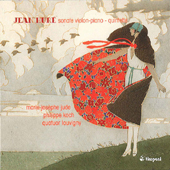
ESSENTIAL RECORDINGS

If anything can be said about the chamber music of Jean Huré (1877-1930) it's that it is nothing if not intense. Facts surrounding his musical training
are not well known, but it seems that most of his fundamental training was received during school from a religious order that drilled into him the basics of piano, organ
and Gregorian chant. It seems the brunt of his musical education was self-taught, mostly from the associations he had while in Paris. His many talents and roles as pianist,
organist, teacher, writer, critic, allowed him to enter musical circles including the likes of Ravel, Koechlin, Cras, D'Indy, Schmitt and so on, and from them absorb and
incorporate many different techniques within his writing. His individuality of spirit prevented him from belonging to any school or musical dogma of the day, which very
well explains his unique and open style.
As previously mentioned, his music is driven from within, where a multitude of ideas come simmering to the top until the next subject comes along and the cycle is
repeated. His Piano Quintet is a prime example of all this. It is a one-movement work just packed with inventive ideas that come to the surface in
rapid succession, like a whirlwind of music sucking up more notes in its path as it moves along. And all this written in a unique style, or possibly a camouflage of many
styles of the day all ingested by Jean Huré and combined to create an ever changing canvas. Nonetheless it is always passionate and emotionally charged. Marie-
Josephe Jude and the Quatuor Louvigny are always up to the task and seem to thrive and excel in all this activity, and play with boundless
energy and commitment.
The Violin Sonata from 1901, recorded here for the first time and performed with deep insights by Philippe Koch on violin and
Marie-Josephe Jude on piano, is a more modest and sombre work with movement subtitles like 'Grave' and 'Dramatique', clear indications of the piece's
spirit. It very much demands a lyrical and singing line from the violin with many beautiful moments throughout its four movements. It is a more emotional work than the
quintet and the musicians involved convey that very well. The Timpani recording is always clear and balanced perfectly for this type of chamber music.
The booklet notes contain detailed information on the methodology behind the music.
Jean-Yves Duperron